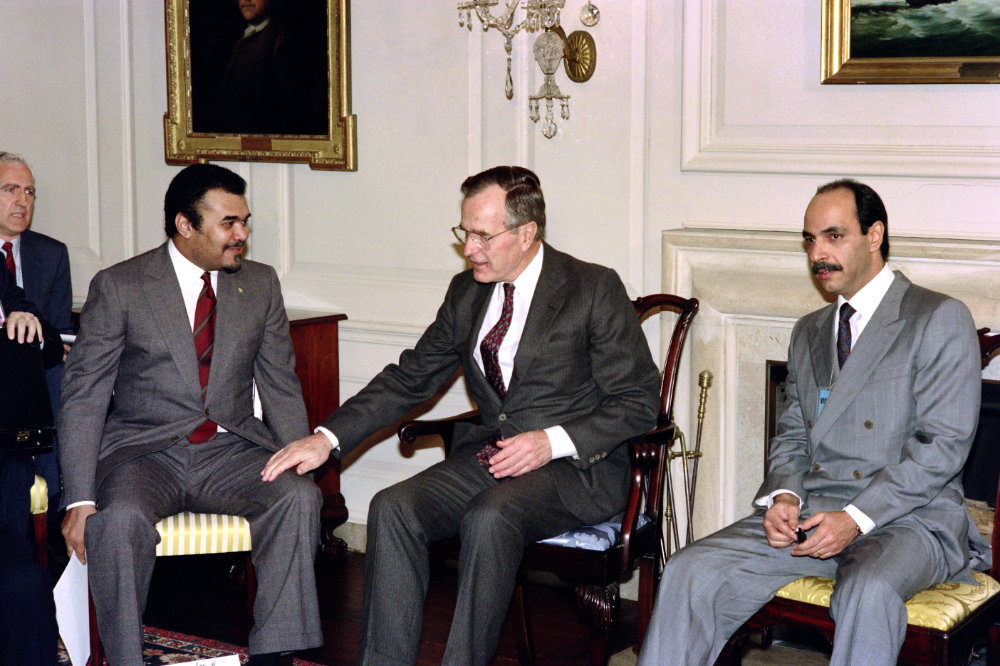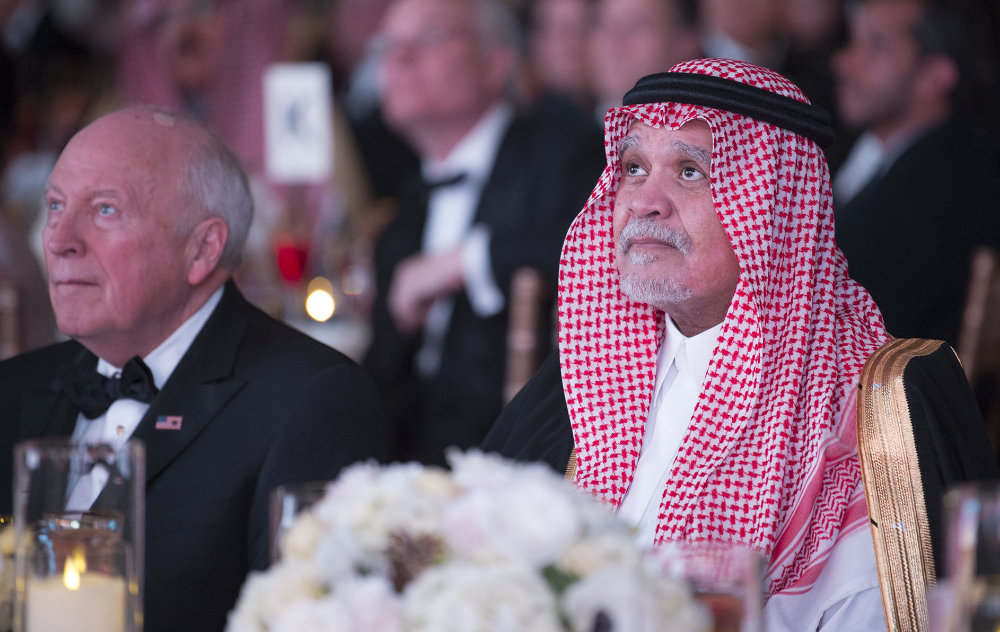RIYADH: As a towering figure of global diplomacy and a former dean of the diplomatic corps in Washington, D.C., Saudi Arabia’s Prince Bandar bin Sultan Al-Saud had an inside track on many of the personalities and issues that shaped the decades since the early 1980s.
But the world had to wait until this month to catch a glimpse of some of the decisions and actions witnessed by him in the rooms where they happened, and which decided the fate of millions of people in the Middle East, Palestinians in particular.
In the event, Al Arabiya’s interview with the former Saudi ambassador to the US, who also served as head of the Saudi Intelligence Agency and the National Security Council, has been dominating the political conversation like no other in recent memory.
His reminiscences are a study in contrasts between Saudi Arabia’s steadfast position on the Palestinian cause and the Palestinian leadership’s self-inflicted wounds and “failures,” including their criticism of Gulf states over the UAE-Israel peace deal.
What has come to light in the course of the Prince Bandar interview are not just the many blunders of Palestinian leaders through the decades but also their dilly-dallying, the cumulative impact of which has cost their people dear and set back their statehood cause.
In a perverse way, however, something that counts in favor of the present Palestinian leadership is that the reason why Prince Bandar decided to make the crucial revelations was their loud condemnations of the US-UAE-Israeli trilateral declaration of August.
Prince Bandar admitted that his initial reaction to the Palestinian statements was one of anger, but afterwards of sadness and hurt.
“I recalled events I was witness to related to the Palestinian cause from 1978 to 2015,” he said, before delivering a fascinating, first-person tour d’horizon, documenting the multidimensional support — moral, material, military, diplomatic and economic — extended by the Saudi leadership and the state to Palestinians from 1939 onwards.

US President George Bush (C) meets at the White House with Saudi Arabian Ambassador Prince Bandar bin Sultan (L) and Kuwaity Ambassador Sheikh Saud Nasir Al-Sabah to discuss the current status of the Arabian Gulf crisis on Dec. 21, 1990 in Washington. (AFP)
Prince Bandar recalled the Saudi role in the aftermath of the 1948 war, when Arab League countries decided to help the distressed Palestinian people.
“Fighting alongside their Egyptian brothers, the Saudi Army entered Palestinian land and did very well … Three thousand Saudi soldiers were on the Egyptian front and inside Palestine. In this war, 150 Saudis were martyred. At the time, the Saudi army had just been established and had limited capabilities, but the armies that had been created before it had limited capabilities as well.”
Even though the current Palestinian leadership’s statements inspire little confidence, the dominant response elicited by Al Arabiya’s interview would appear to be: If only they could rewind history and try it a different way. Consider Prince Bandar’s account of the events of 1986, when King Fahd asked him to propose to US President Ronald Reagan to do something to help the Palestinian cause.
“I went and met with President Reagan. I informed him that the Palestinians now agreed to UN Resolution 242, which they had rejected in 1973 … I took a letter to Secretary of State (George) Shultz saying that if the Palestinians recognized UN Resolution 242 … denounce terrorism and recognize the right of the region’s states to live in peace, Reagan was ready to recognize the PLO and hold talks with it.
“I left and called King Fahd, and told him about the offer. ‘Are you sure?’ he asked. I told him that I had the letter written and signed so he told me to go ahead with the plan and asked me to head to Tunisia to deliver the letter to Abu Ammar (Yasser Arafat) directly. I went there and met Abu Ammar (who) stood up as usual, and said, ‘Palestine is free!’ and he started dancing and kissing and hugging me.
“It is well known to everyone that Abu Ammar always loved to kiss people. I asked him about the announcement date so he could go meet with (Jordan’s) King Hussein to hold a joint declaration and so on. ‘Not possible,’ he replied. ‘How is it not possible? This is what you asked for and we got it for you,’ I said. He replied: ‘I follow an Arab code of ethics.’ I said: ‘Absolutely, now go for it and don’t waste another opportunity.’”
“He then proceeded to tell me that he first needed to go to Saudi Arabia to thank King Fahd for what he had done before going to King Hussein … when he requested a plane, I told him he could use the plane I came on to go to Jeddah. He took the plane and we did not see him for a month. He went to South Yemen and North Korea, with whom we did not even have ties. He also visited countries in Africa and Asia before arriving in the Kingdom. After all this time, the Americans said that they were no longer interested. Many things had happened and their focus had shifted.”
Prince Bandar was equally candid in his take on the Arab bloc’s repudiation of the 1978 Camp David agreement. “It became the mistake that played a major role in deepening the Palestinian tragedy, as the Arab nation boycotted Egypt, the mother of the world, because the Palestinians rejected the autonomy provisions … and considered this peace treaty a betrayal of the Arab nation,” he said.

Former Saudi Ambassador to the US Prince Bandar bin Sultan (R) and former US Vice President Dick Cheney attending Saudi-US Partnership Gala event in Washington, DC. (Photo by Bandar Al-Jaloud / Saudi Royal Palace / AFP)
After the Oslo Accords of 1993 and 1995, Prince Bandar said, he sought Arafat’s views on the Camp David Treaty. When Arafat told the prince “‘Bandar, Camp David’s autonomy provisions were ten times better than the Oslo Accord.’ I said: ‘Well, Mr. President, why did you not agree to it?’ He said, ‘I wanted to, but (Syrian President) Hafez Al-Assad threatened to kill me and to drive a wedge among the Palestinians, turning them against me.’ I thought to myself: ‘So he could have been one martyr and given his life to save millions of Palestinians,’ but it was as God willed it.”
Fast forward to Feb. 2007, when King Abdullah brought Palestinian President Mahmoud Abbas and Hamas leader Khaled Meshaal to Makkah for crisis talks to end deadly Fatah-Hamas violence and form a unified Palestinian leadership.
“After (King Abdullah) checked what they had written and read it in front of everyone and asked them to vow before God and in front of everyone that they agree to this deal, he asked them to shake hands and congratulated them, saying, ‘God is our witness, and we are in his holy land. (Prince) Saud (bin Faisal), take the brothers to the Kaaba and let them pledge their word before God and before the Palestinian people.’ Only a few days after they left Saudi Arabia, we received news they had already gone back on their word and started conspiring and plotting against each other once again.”
Of course, as Prince Bandar made it clear, the follies of their leaders do not mean that the Palestinian people have forfeited the right to return to their homeland or demand that Israel withdraw from Arab lands. Peace cannot be made at the expense of Palestinian rights, he said, adding poignantly: “A single drop of Palestinian blood is more precious than the earth’s treasures.”
Having made that point, Prince Bandar asserted that whenever the Palestinian leadership asked for advice and help, Saudi Arabia would provide them with both without expecting anything in return, but they would always take the help, and ignore the advice.
“Then they would fail and turn back to us again, and we would support them again, regardless of their mistakes,” he said. This nature of the relationship, he felt, might have convinced the Palestinian leadership that “there is no price to pay for any mistakes they commit towards the Saudi leadership or the Saudi state, or the Gulf leaderships and states.”
Noting “the circumstances and times have changed,” Prince Bandar added: “I think it is only fair to the Palestinian people to know some truths that have not been discussed or have been kept hidden.”



























